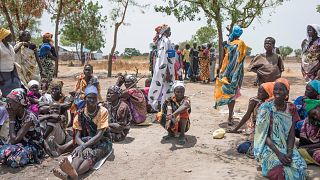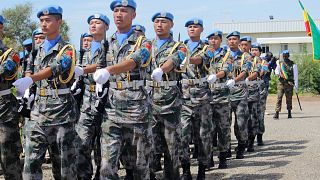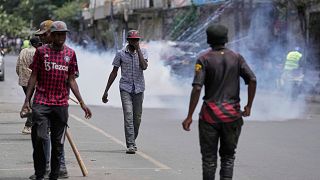South Sudan
Longtime humanitarian leaders and analysts are troubled by what they see as a new teaming up of warring governments and for-profit contractors in aid distribution.
The global aid community is warning of a controversial development in humanitarian work: private contracting firms led by former US intelligence officers and military veterans delivering aid to some of the world's deadliest conflict zones, in operations organised with governments that are combatants in the conflicts.
In South Sudan, aid flights operated by retired American military officers drop food supplies for civilians displaced by fighting in the war-torn country.
The moves are roiling the global aid community, who warn of a more militarised, politicised and profit-seeking trend that could allow governments or combatants to use life-saving aid to control hungry civilian populations and advance war aims.
In South Sudan and Gaza, two for-profit US companies led by American military veterans are delivering aid in operations backed by the South Sudanese and Israeli governments.
The American contractors say they are putting their security, logistics and intelligence skills to work in relief operations. Fogbow, the US company that carried out last week's air drops over South Sudan, says it aims to be a “humanitarian force.”
“We’ve worked for careers, collectively, in conflict zones. And we know how to essentially make very difficult situations work,” said Fogbow President Michael Mulroy, a retired CIA officer and former senior defence official in the first Trump administration, speaking on the airport tarmac in Juba, South Sudan's capital.
Humanitarian principles
But the United Nations and many leading non-profit groups say American contracting firms are stepping into aid distribution with little transparency or humanitarian experience, and, crucially, without commitment to humanitarian principles of neutrality and operational independence in war zones.
Policy lead for Oxfam, Bushra Khalidi said the use of these companies turns aid and relief into a "tool of coercion" and "blurs the line between humanitarian assistance and military objectives" putting civilians and humanitarian workers at "serious risk."
Fogbow took journalists up in a cargo plane to watch their team drop 16 tons of beans, corn and salt for South Sudan's Upper Nile state town of Nasir.
Residents had fled homes there after fighting erupted in March between the government and opposition groups.
Mulroy acknowledged the controversy over Fogbow's aid drops, which he said were paid for by the South Sudanese government.
But, he maintained: “We don’t want to replace any entity” in aid work.
Fogbow's American contractors were in the spotlight last year for their proposal to use barges to bring aid to Gaza, where Israeli and Egyptian restrictions were keeping food from coming in overland.
The US focused instead on an American military effort to land aid via a temporary pier.
Since then, Fogbow has carried out aid drops in Sudan and South Sudan, east African nations where wars have created some of the world's gravest humanitarian crises.
Fogbow says ex-humanitarian officials are also involved, including former UN World Food Program (WFP) head David Beasley, who is a senior adviser.
Gaza aid distribution
Operating in Gaza, meanwhile, Safe Reach Solutions, led by a former CIA officer and other retired US security officers, has partnered with the Gaza Humanitarian Foundation, a US-backed nonprofit group that Israel says is the linchpin of a new aid system wresting control from the UN and other humanitarian aid groups.
Starting in late May, the American-led operation in Gaza has distributed food at a handful of fixed sites in southern Gaza, in line with Prime Minister Benjamin Netanyahu's stated plan to use aid to concentrate the territory's more than 2 million people in the south, freeing Israel to fight Hamas elsewhere.
Since then, dozens of Palestinians have been killed and hundreds wounded in near daily shootings as they tried to reach aid distribution sites, with witnesses saying Israeli troops nearby have repeatedly opened fire.
The Israeli military has denied firing on civilians.
It says it fired warning shots in several instances, and fired directly at a few “suspects” who ignored warnings and approached its forces.
It’s unclear who is funding the new operation in Gaza.
No donor has come forward and the US says it’s not funding it.
Air drops
The air drop over South Sudan went without incident, despite fighting nearby. A white cross marked the drop zone.
Only a few people could be seen, although Fogbow contractors said they had seen more newly returned townspeople on previous drops.
Fogbow acknowledges glitches in mastering aid drops, including its early operations last year in Sudan’s South Kordofan region that ended up with too-thinly-wrapped grain sacks split open on the ground.
After gaining independence from Sudan in 2011, South Sudan is emerging from a civil war that killed nearly 400,000 people.
Rights groups say its government is one of the world’s most corrupt, and until now has invested little in quelling the dire humanitarian crisis.
South Sudan said it engaged Fogbow for air drops because of the Trump administration’s deep cuts in US Agency for International Development funding.
Humanitarian Minister Albino Akol Atak said the drops will expand to help people in need throughout the country.
But two South Sudanese aid groups question the government's motives.
Asked about suspicions the aid drops were helping South Sudan's military aims, Fogbow's Mulroy said the group has worked with the UN World Food Program to make sure “this aid is going to civilians.”
In a statement, WFP country director Mary-Ellen McGroarty said: “WFP is not involved in the planning, targeting or distribution of food air-dropped” by Fogbow on behalf of South Sudan's government, citing humanitarian principles.













01:36
UN General Assembly votes overwhelmingly in favour of immediate ceasefire in Gaza
01:27
After voting Republican, some Arab-Americans are disappointed with Trump
01:09
Wars displace over 122 million people as global aid dwindles – UNHCR
01:04
U.S., Iran to hold sixth round of negotiations in Oman
01:02
US imposes sanctions on Palestinian NGO and five charities over alleged terrorism funding
01:32
Land convoy leaves Tunisia for Gaza, in an effort to break Israel's siege